5 Mental Health and Self Care Tips for RV Living:2025 Guide
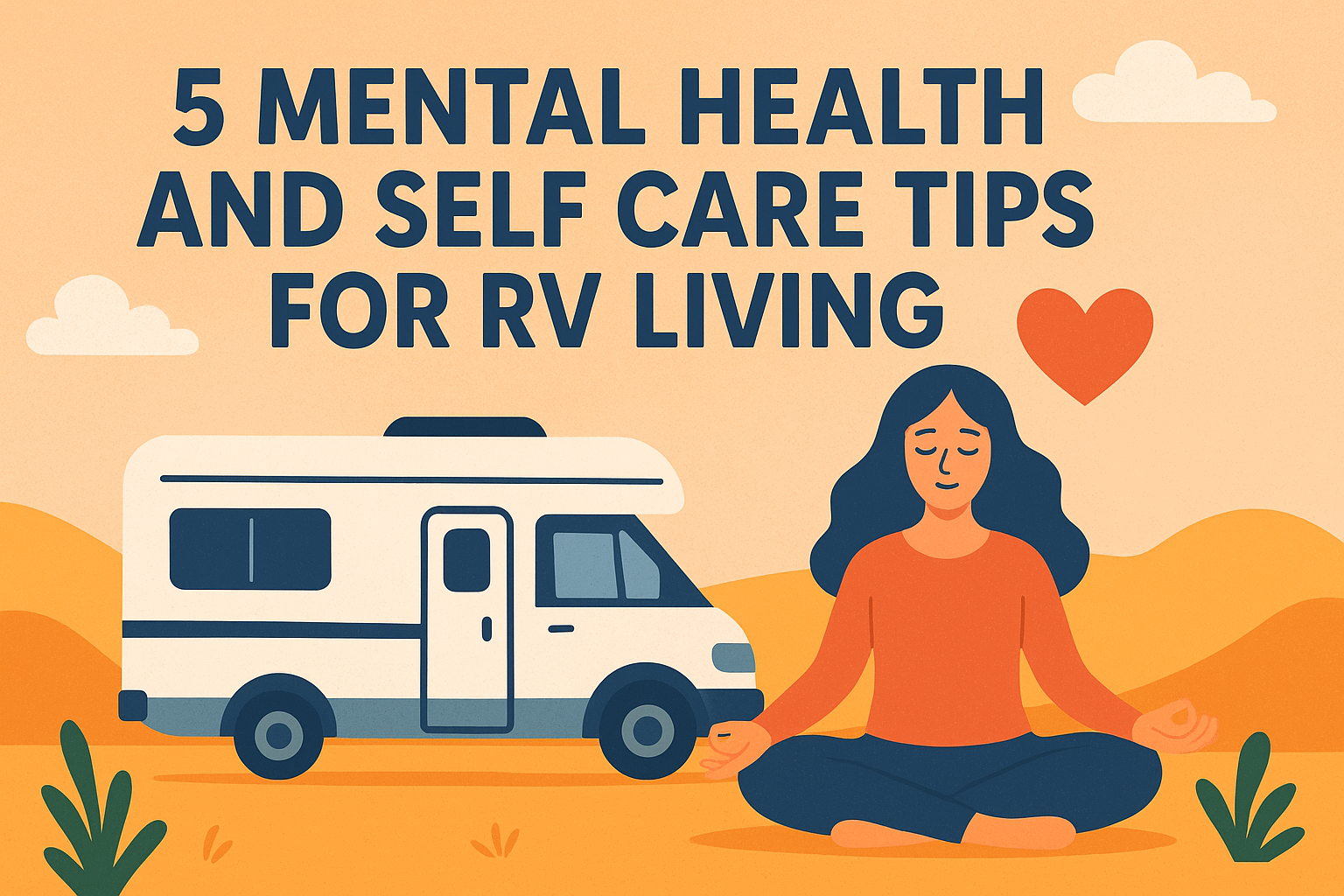
Discover 5 essential mental health and self-care tips for RV living. Stay balanced, happy, and healthy on the road with these practical and easy-to-follow strategies.
Introduction
Living in an RV offers freedom and adventure, but it also brings unique mental health challenges. Small spaces, constant travel, and limited social interactions can affect well-being. Taking care of your mental health and practicing self-care is essential for a happy RV lifestyle. This guide shares 5 simple tips to help you stay balanced and healthy while living on the road in 2025.
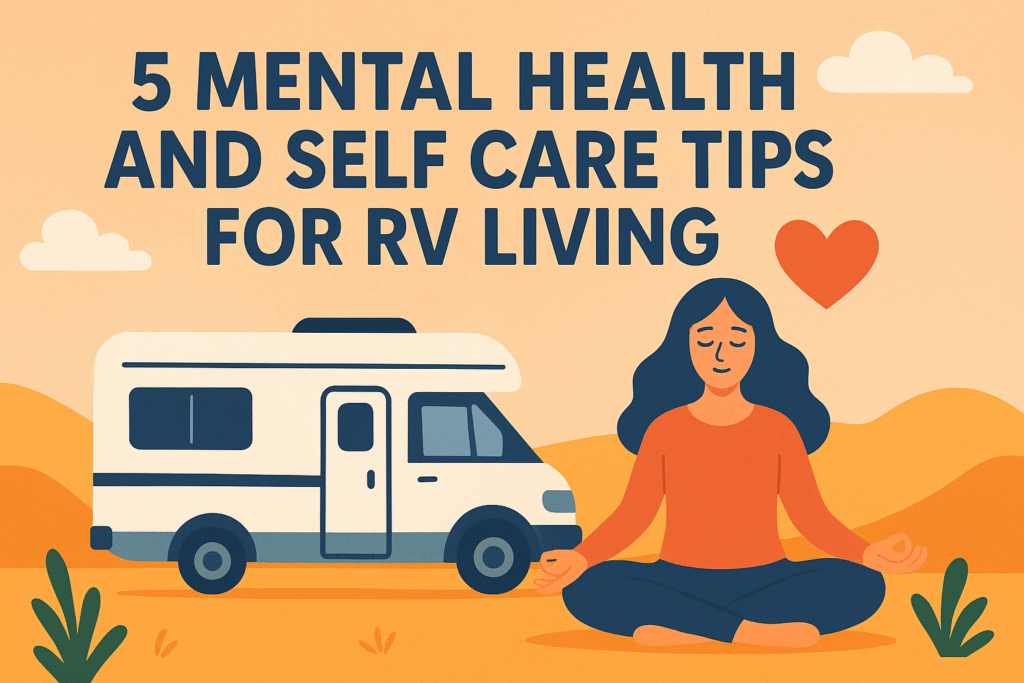
1. Stay Connected:
- Maintain relationships: with friends and family back home through video calls or social media.
- Build a community: with other RVers by joining groups or attending meetups to combat feelings of loneliness.
2. Establish a Routine:
- Create a consistent daily schedule
for meals, work, and relaxation to bring a sense of stability to your on-the-road lifestyle. - Set goals and intentions for your trips, whether general or specific, for purpose and direction, helping you adapt to changes .
3. Practice Mindfulness:
- Engage in mindfulness techniques such as meditation, deep breathing exercises, or journaling to manage stress and increase mental clarity.
- Take time for contemplation, by stargazing or enjoying a quiet moment , to foster a sense of peace.
4. Prioritize Physical Health:
- Maintain a healthy diet: by preparing meals in advance with nutritious, organic ingredients to avoid decision fatigue.
- Incorporate regular physical activity, such as nature walks or yoga, to improve mood and well-being.
5. Embrace Nature:
- Spend time outdoors
To reduce stress and improve your mood, simple activities like a short walk or enjoying your morning coffee in nature can be beneficial. - Engage with your surroundings,
like going for nature walks or bird watching
Living full-time in an RV offers freedom and adventure, but also unique mental health challenges. The confined space, constant travel, and social isolation can affect well-being if not managed carefully. Prioritizing mental health and practicing self-care are key to thriving in the RV lifestyle.
5 Mental Health and Self-Care Tips
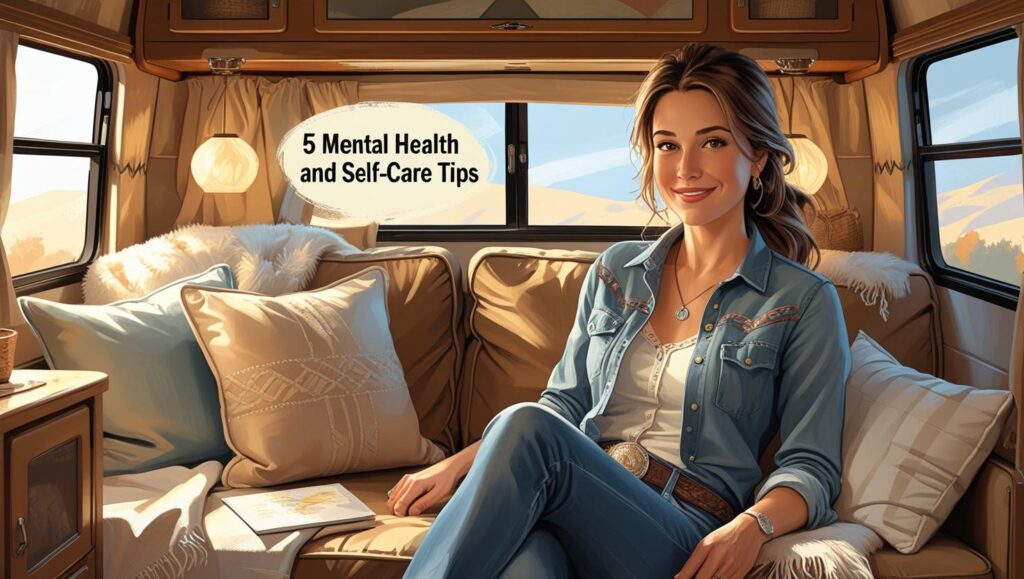
Here are 5 essential tips to help maintain balance, reduce stress, and enjoy your journey.
Without traditional schedules, it’s easy for days to blur together, which can increase anxiety and stress. A routine that includes set times for waking, meals, work, and relaxation promotes mental stability.
Establish a Daily Routine: A Foundation for Mental Well-being in RV Living
Living full-time in an RV offers unparalleled freedom and flexibility, but this lack of a fixed schedule can sometimes lead to stress, anxiety, and a sense of disorganization. Establishing a consistent daily routine is a powerful way to create structure, promote mental stability, and improve overall well-being on the road.
Why Routines Matter in RV Life
- Provides Stability: Amid frequent changes of location and surroundings, a routine acts as an anchor that grounds your day, reducing feelings of uncertainty.
- Supports Mental Health: Regular schedules help balance hormones like cortisol, improving stress management and mood regulation.
- Enhances Productivity: Structured blocks for work, chores, and relaxation boost focus and accomplishment, preventing overwhelm.
- Improves Sleep Quality: Consistent wake-up and bedtimes regulate circadian rhythms, supporting restful sleep.
- Creates Space for Self-Care: Allocating time intentionally for wellness activities ensures they don’t get neglected amidst travel demands.
Components of a Well-Balanced Daily Routine
- Consistent Wake-Up and Bedtime
Even when on the road, aim to wake and sleep around the same times daily. This consistency helps regulate your internal clock, improving energy and mood. - Morning Rituals to Start Positively
Incorporate calming or motivating activities like meditation, journaling, stretching, or reading. These set a mindful tone and prepare you for the day ahead. - Scheduled Work or Projects Time
Block dedicated hours to focus on remote work, planning trips, RV maintenance, or hobbies. Use tools like calendars or timers to build focus in small spaces. - Regular Meals and Hydration
Eating balanced meals at routine times supports physical and mental health. Plan meals considering limited space and resources to avoid skipped or unhealthy eating. - Physical Activity Breaks
Integrate exercise—walking, yoga, hiking, or simple stretching—into your daily routine to maintain fitness.
Tips for Creating and Sticking to Your Routine
- Start Small: Introduce one or two new ritualistic habits and gradually build your routine.
- Be Flexible: Life on the road is unpredictable; allow your routine to adapt, but try to preserve core elements.
- Use Reminders: Set alarms, calendar notifications, or habit-tracking apps to stay on course.
- Prioritize: Identify activities that boost your well-being and give them priority in your schedule.
- Balance Productivity and Rest: Avoid burnout by mixing focused work with adequate breaks and leisure.
Establishing a daily routine is essential for maintaining mental health, productivity, and balance in the dynamic lifestyle of RV living.
It transforms overwhelming freedom, allowing you to thrive physically, mentally, and emotionally as you explore the open road.
2. Prioritize Physical Activity and Outdoor Time
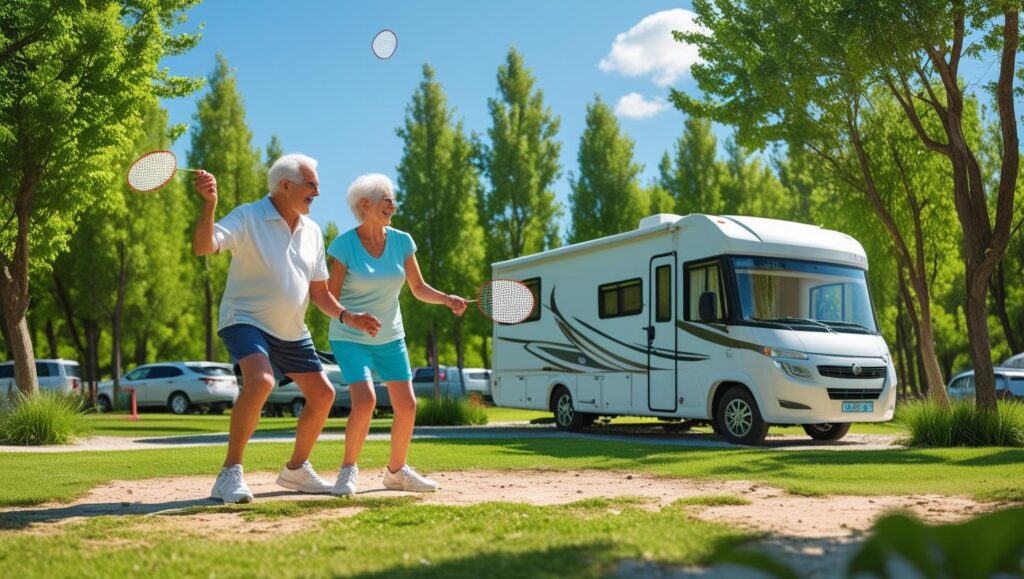
Physical Activity And Outdoor Time
Exercise and nature are proven mood boosters. Find ways to stay active regularly, whether it’s walking, hiking, yoga, or biking.
- Explore Outdoor Activities such as kayaking, paddleboarding, rock climbing, or guided hiking tours for fun and fitness.
- Mindful Movement
practices like tai chi or qigong that combine gentle movement with meditation to soothe both body and mind. - Incorporate Exercises
Mix cardio and flexibility workouts to keep exercise balanced and engaging, which helps fitness and reduces boredom. - Regular Movement Breaks
take short walks during sedentary periods, especially important if working remotely. - Use Fitness Equipment
Equip your RV with lightweight items like resistance bands, jump ropes, or yoga mats to maintain workouts.
3. Create Social Connections and Community
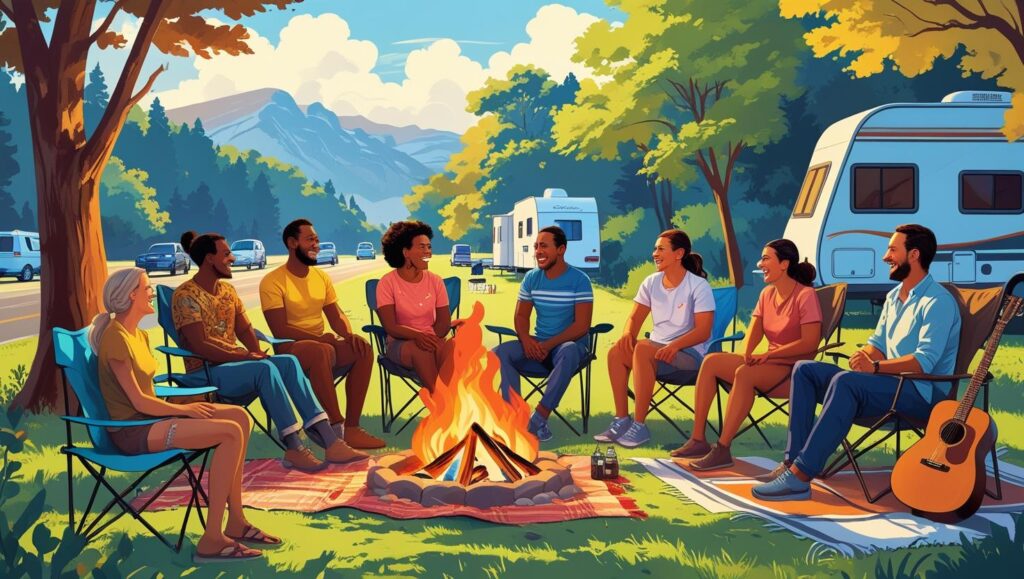
Social Connections And Community
Social isolation is common in RV living, but can be mitigated by building connections on the road and online.
- Attend RV Rallies and Festivals
Participate in organized RV events, rallies, and festivals, which provide great opportunities to meet people, share experiences, and build friendships. - Join Online RV Groups and Forums
Engage in active RV-related Facebook groups, Reddit communities, and dedicated forums to connect virtually with fellow travelers worldwide. - Use Social Apps Geared to Travelers
Utilize apps like Meetup, Couchsurfing, or Campendium to find local events, hangouts, or fellow RVers nearby. - Organize or Join Potlucks and Social Dinners
Host or attend shared meals at campgrounds to foster camaraderie and spend quality social time with other RVers. - Participate in Volunteer Opportunities
Volunteer at local events, national parks, or community projects near your stops to meet locals and other travelers while giving back.
4. Design a Comfortable and Personal Space
Your RV is your home and sanctuary. Make it inviting and relaxing with personal touches to support mental well-being.
- Incorporate Personal Touches
Add items that bring you joy and comfort, such as family photos, favorite decorations, cozy blankets, or meaningful artwork, to make your RV truly feel like home. - Use Calming Colors and Textures
Choose soft, neutral, or your favorite calming colors for cushions, curtains, and bedding. Mix textures like plush throws and cushions to create a welcoming atmosphere. - Create Defined Zones
Designate specific areas for sleeping, working, dining, and relaxing to help maintain mental boundaries and keep your space organized and functional. - Maximize Natural Light and Ventilation
Position seating near windows and keep them unobstructed to enjoy sunlight and fresh air, boosting mood and air quality inside the compact space. - Keep It Tidy and Clutter-Free
Regularly declutter and organize your belongings to reduce stress and make the area feel more spacious and peaceful, enhancing comfort and relaxation.
5. Practice Mindfulness and Stress Reduction Techniques

Mindfulness and Stress Reduction Techniques
Mindfulness exercises like deep breathing, meditation, and progressive muscle relaxation can help manage the stresses of RV life.
- Start with Simple Breathing Exercises
Practice deep, diaphragmatic breathing to calm the nervous system. Even a few minutes of focused breathing can reduce anxiety and promote relaxation. - Use Guided Meditation Apps
Utilize apps like Headspace, Calm, or Insight Timer for accessible, guided mindfulness sessions tailored to beginners and advanced practitioners alike. - Incorporate Progressive Muscle Relaxation
Systematically tense and relax muscle groups to release physical tension accumulated from travel stress or cramped spaces. - Practice Body Scan Meditation
Regularly check in with your body to detect and release areas of tension or discomfort, promoting greater bodily awareness and relaxation. - Mindful Walking in Nature
Engage in slow, intentional walking, focusing on sensory experiences like sights, sounds, and smells around you, which helps ground your mind in the present.
These mindfulness and stress reduction practices can help RVers manage the emotional ups and downs of life on the road and cultivate inner peace amid constant change.
Self-Care Trackers for RVers
Self-care trackers are tools (digital apps, printable journals, or planners) designed to help RVers monitor and maintain their physical and mental health habits while on the road. They keep users accountable and aware of their well-being routines despite the unpredictability of RV life.
Features and Benefits of Trackers
- Track daily habits such as sleep, hydration, exercise, meals, and mood.
- Set reminders for medication, relaxation breaks, or social time.
- Log feelings of stress or loneliness to identify patterns and triggers.
- Provide space for gratitude journaling or note-taking to boost positivity.
- Portable and easy to use anywhere, whether offline or online.
Mindfulness Guides for RVers
Mindfulness guides are specialized resources that teach RVers techniques to reduce stress, stay present, and cultivate mental resilience in the unique context of RV living.
Typical Contents:
- Step-by-step meditation exercises are adaptable to small spaces and busy schedules.
- Breathing techniques to manage anxiety during unexpected challenges.
- Guided practices for acceptance and flexibility amid the uncertainties of travel life.
- Tips on creating a calming environment inside the RV to support mindfulness moments.
- Audio or video resources accessible from any location with or without internet.
Social Connection Resources for RVers
Social connection resources are platforms and tools that help RVers build and maintain meaningful relationships despite physical distance and constant movement.
Examples and Uses:
- Listings of online RV groups, forums, Facebook communities, and niche social media channels.
- Apps to find local RV meetups, rallies, and events nearby based on your location.
- Networks to connect with fellow RVers for carpooling, campground recommendations, and friendship.
- Volunteer or community engagement opportunities in travel destinations.
- Techniques and templates for staying connected with family and friends via calls, messages, and shared activities.
Why These Matter for RVers
Living on the road can be isolating and stressful due to constant change, limited space, and distance from loved ones. These tailored tools and resources provide structure, stress relief, and social support, essential to maintaining balance and happiness in the RV lifestyle.
Bonus Tips
1. Keep a Journal to Track Your Moods, Challenges, and Wins
Maintaining a mood or self-care journal is a powerful tool for emotional awareness and mental well-being, especially during the unpredictable RV lifestyle.
- What it is: A mood journal is a diary where you regularly record your emotional states, triggers, reactions, and positive experiences.
- Benefits:
- Enhances self-awareness by helping you recognize emotional patterns and triggers.
- Improves emotional regulation by allowing you to anticipate stressors and develop coping strategies.
- Provides a therapeutic outlet to express feelings and reduce mental clutter.
- Supports problem-solving by identifying recurring challenges and brainstorming solutions.
- Tracks progress and personal growth over time, reinforcing effective coping methods.
- How to start: Use a notebook, digital app, or even voice memos to note daily feelings, stressful events, and positive moments. Include context like environment, social situations, and physical health to spot correlations. Reflect weekly or monthly to find patterns and actionable insights.
2. Prioritize Adequate Sleep by Maintaining a Dark, Quiet Environment

An RV Bedroom
Good quality sleep is foundational to mental health and is often disrupted by the unique conditions of RV living.
- Challenges in RVs: Noise from campgrounds, streetlights, or neighbors, and light pollution can interfere with sleep cycles. Confined spaces and different sleeping surfaces also play a role.
- Sleep Support Strategies:
- Use blackout curtains or window covers to block external light.
- Wear comfortable earplugs or use white noise machines or apps to mask disruptive sounds.
- Establish wind-down routines such as limiting screen time, avoiding caffeine late in the day, and practicing relaxation techniques.
- Invest in a quality mattress or topper designed for RV beds to improve comfort.
- Keep the sleeping area cool and well-ventilated to promote restful sleep.
3. Seek Professional Mental Health Support if Needed Via Teletherapy Services

Telepathy Is Real
While self-care is valuable, professional mental health support is crucial when challenges become overwhelming.
- Teletherapy Options:
- Online counseling platforms have made mental health support accessible anywhere, including remote RV locations.
- Many therapists offer video, phone, or chat sessions, making therapy flexible and private.
- Services can address anxiety, depression, stress management, or adjustment challenges related to RV life.
- Benefits of Early Support:
- Prevents symptom escalation by addressing issues promptly.
- Provides tailored coping strategies suited to your individual situation.
- Offers a confidential, non-judgmental environment for exploring feelings and challenges.
- How to Access: Research approved, licensed online therapy platforms, and find providers who suit your needs and schedule. Your insurance may cover some teletherapy options.
Conclusion
These bonus tips deepen your mental health care toolbox for the RV lifestyle. Journaling fosters self-understanding and emotional insight, prioritizing sleep ensures physical and psychological restoration, and seeking professional help provides essential support when life on the road feels especially challenging.
Together, these strategies can help create a resilient foundation for thriving mentally and emotionally while exploring the freedom of RV living.
The RV lifestyle is invigorating but requires special attention to mental health and self-care. By creating routines, staying active, fostering connections, personalizing your space, and practicing mindfulness, you can nurture your well-being and make your journey rewarding in body and mind.
FAQs
A routine provides structure and stability amid constant change, helping to reduce anxiety, improve sleep, and maintain productivity on the road.
How can RV living affect physical activity levels, and what can I do about it?
Limited space and frequent travel can reduce exercise opportunities. Prioritizing outdoor activities and using portable exercise equipment keeps you active and supports mental well-being.
Joining RV clubs, attending meetups, engaging in online communities, and maintaining regular contact with family and friends help build and sustain social connections.
Personalize your space with calming colors, cozy textiles, and meaningful items, and keep it tidy and organized to promote relaxation and reduce stress.
Simple breathing exercises, guided meditation apps, progressive muscle relaxation, and mindful walking outdoors are effective and easy to practice even in limited spaces.
